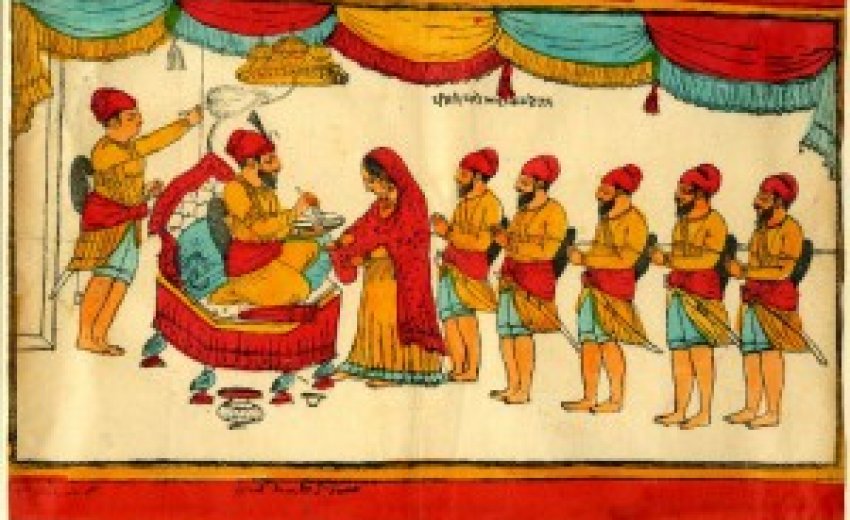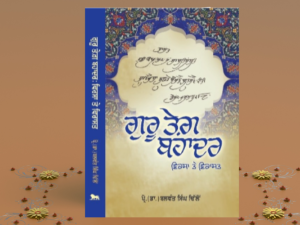This article is based on excerpts from the Spirit of the Sikh written by Professor Puran Singh in 1920's and published by Punjabi University Patiala in two volumes during 1982. Puran Singh was a great scientist, mystic poet, and a visionary and interpreter of the Sikh cultural consciousness. This article reflects the personal views of the great Sikh scholar which seem to be relevant for understanding Sikhism and the geopolitical aspirations of the Sikhs.
To read earlier ones, follow:
Part I
Part II
3. The Khalsa Ideal - State and Democracy
The Khalsa is the ideal future international state of man: it is an absolute monarchy of the kingdom of heaven for each and every man, the absolute democracy, distribution of bread and raiment of the kingdom of labour on this earth - all in one. It is democracy of feeling all on this physical plane of life, where most misery is due to man's callousness to man. It is brotherhood of the souls where intensity of feeling burns out all differences [9].
In the realms of the soul, each is to have his own measure of the Guru's joy and sorrow and love and feeling and spiritual delight, according to his individual capacity. This will constitute the measure of the real aristocracy of each one's genius; but bread and raiment, the barest necessities of the physical body shall, in this kingdom of love for the Guru, never be denied to any one. If the Guru's ideal state, or even an approach to it, is ever made by man, no one will thenceforward die of hunger or go naked. Death cannot be prevented, innate differences cannot be destroyed; but physical privation will be prevented here on this earth by man himself. Let mountains be high, flowers small and grass low, but all shall be clothed with the beauty of God and fed with His abundance. The true vindication of the Khalsa commonwealth and its ideals as announced by Guru Gobind Singh, have yet to appear in terms of the practice of those ideals by those having faith in the Guru. The modern world is, however, busy evolving its version of the Guru's Khalsa state out of social chaos. This much be said at once, that the Khalsa is more than a mere republic of votes of little men who must be influenced to give votes. It is more than the Soviet, which aims at the change of political environment and law, to bring the Heaven of equal distribution on earth because without the transmutation of the animal substance of man, of selfishness into sympathy, there can be no true socialism.
The Guru Khalsa state is based on the essential goodness of humanity, which longs to share the mystery and secret of the Creator, and longs to love the Beautiful one living in His creation. The Guru thus admits man to an inner kingdom of the soul, where each and every person receives such abundance of pleasure and the beauty of His Love, that selfishness dies of itself. Inspiration to the higher life drives out the lower. Each one, according to his worth and capacity to contain, has enough of the inner rapture of the beauty of God in him, so that he lives quite happy and contented without interfering in anyone's affairs or robbing any of his rightful freedom to increase his own pleasure. This endless self-sacrifice in utter gladness of a new realization is the sign and symptom of the true 'Nam' culture of the Guru. No one can be man of truly human society, who has not obtained this divine spark which puts the self at rest, which thereby imbibes a nobility from God to leave everything along and gaze at Him with unending rapture and renunciation. Man need to be truly and inwardly a divine aristocrat to be truly democratic in this world.
In the constitution of the Khalsa commonwealth [10], the greatest act of genius of Guru Gobind Singh was when he transferred the divine sovereignty vested in him to the God-inspired people, the Khalsa. When speaking of the people, the Guru speaks of the people whose personality is transmuted into the divine personality of selfless being. As the chemist talks of pure elements just as they occur in nature, the Guru refers to the 'Pure' of the Cosmic Spirit and not as they are found with their blind animal instincts. In this one act lies our history and the future history of human progress. At Chamkaur when all was lost, he made His Five Disciples representative of the Guru, and gave them his insignia of Guruship and saluted them. The constitution of the Khalsa was thus built on the heart-shrines of humanity inspired with love of God, on the God-consciousness of Disciples, and not on law-books. Guru Gobind Singh would have died fighting on the battlefield even, as a while before, his two young sons had obtained the glory of martyrdom. But these 'Five Enthroned' asked him to go from the scene, and to do for the Khalsa, what only he, Guru Gobind Singh, could do. So, he went, herein the Guru's benign submission to the will of the Khalsa was complete and unconditional. To obey, to continue to live instead of fighting and dying, even in that great personal affliction of having seen his sons and his dear disciple soldiers dying before him, overwhelmed by odds, yet to go and live for them, as bidden by them, is the supreme self-sacrifice of God for man, out of whose red flames of blood is born this Khalsa with the mysterious destiny.
In the Khalsa constitution, the people inspired by the natural goodness of humanity, by the spontaneous Divinity of God, by the Guru's mystic presence in all beings, are made supreme. They are the embodiment of Law and Justice fulfilled for ever in the love of Man. This state has but the Guru as Personal God. In this state, the Khalsa, the law of man's natural goodness is the only law [11].
Guru Gobind Singh was neither a Caesar nor an Aurangzeb. He was the true king of the people and a comrade of the people, in the truest representative spirit. Guru Gobind Singh founded the true democracy of the people in which there were no dead votes or votes won by mental persuasion or interested coercion. Democracy was a feeling in the bosom of the Khalsa and it gave an organic cohesion to the people who founded both society and state on the law of love, on Justice and Truth, not an impersonal system of the will of the blinded mob-representation by sympathy and not by dead votes. The Khalsa-State is an Ideal; Sikhs may die, it does not. It is immortal [12].
Prof. Hardev Singh Virk
Department of Physics, Guru Nanak Dev University
Amritsar - 143005, India.
E-mail: [email protected]
-----------------------------
References:
9. Ibid, Vol. I, p. 9.
10.Ibid, Vol. I, p. 23.
11.Ibid, Vol. I, p. 24.
12.Ibid, Vol. I, p. 27.





